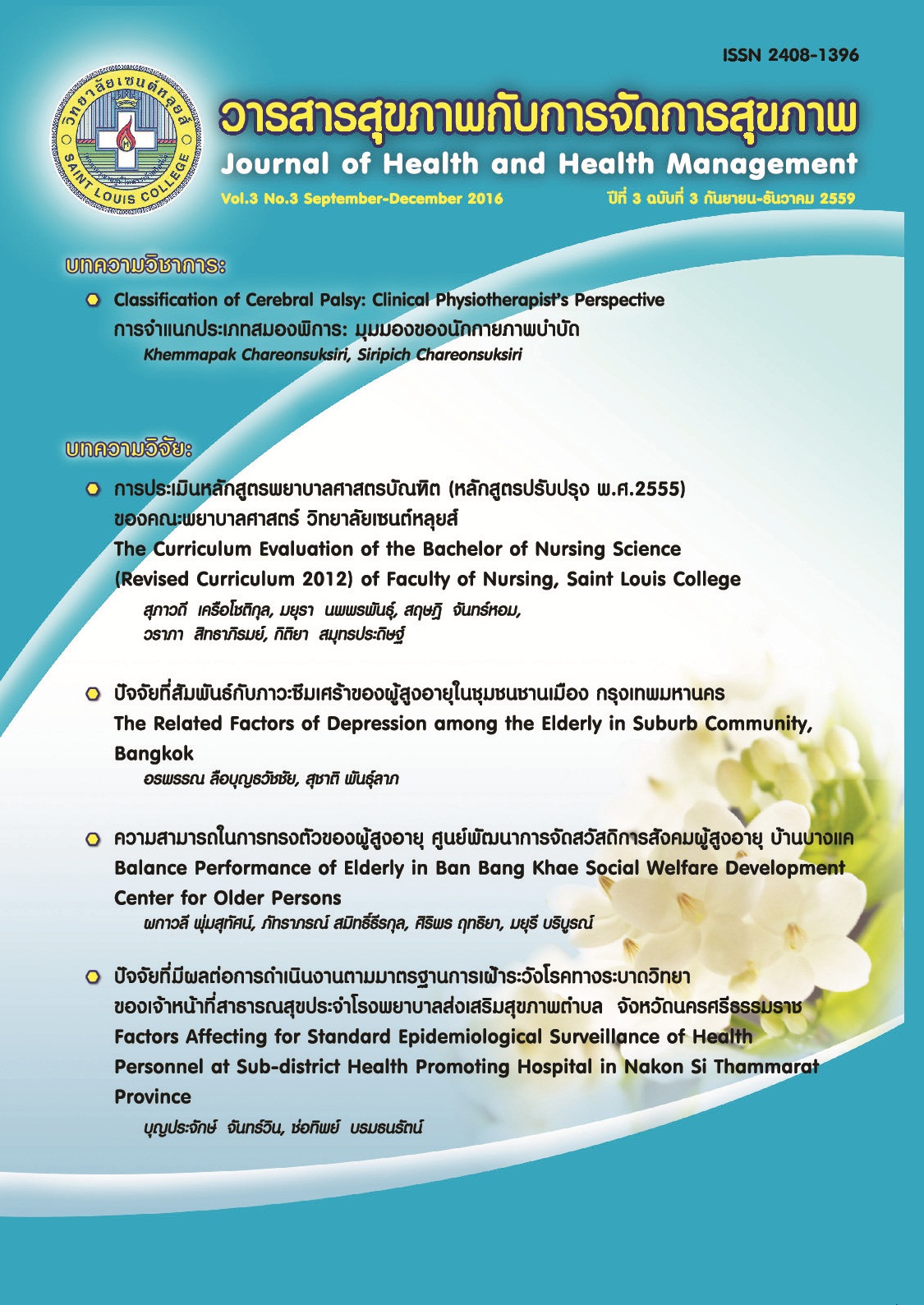The Related Factors of Depression among the Elderly in Suburb Community, Bangkok
Keywords:
suburb community, depression, elderlyAbstract
The objectives of this descriptive research were to study the depression level and to investigate the factors that correlated with depression of the elderly person in suburb community, Bangkok. Samples of this study were 130 persons who came in mental health clinic of psychiatric hospital and public health center in suburb community, Bangkok. The instruments of this study were demographic data questionnaires, the Thai geriatric depression scale, Self-esteem scale, and Social support questionnaires. All of these instruments were validated by three experts and tested for reliability by Cronbach’s alpha coefficient. The reliability of the scales were 0.81, 0.63, and 0.97 respectively. Data were analyzed with frequency, percentage, mean, standard deviation, t-test, Chi-square test, and Pearson correlation coefficient. The results of this study revealed that the mean score of depression of the elderly in suburb community, Bangkok were mild level. The factors that correlation significantly at 0.05 level with depression were 1) the person who has been psychiatric history was positive correlation with depression 2) self- esteem, and social support were negative correlation with depression at -0.567 and -0.454, respectively.
References
จีราพร ทองดี, ดาราวรรณ รองเมือง และฉันทนา นาคฉัตรีย์. (2555). ภาวะสุขภาพและคุณภาพชีวิตของผู้สูง อายุในจังหวัดชายแดนภาคใต้. วารสารพยาบาล กระทรวงสาธารณสุข, 22(3), น. 88-99.
พจนา เปลี่ยนเกิด. (2557). โรคซึมเศร้า: บทบาทพยาบาล ในการดูแลรักษา. วารสารพยาบาลทหารบก, 15(1), น. 18-21.
กระทรวงการพัฒนาสังคมและความมั่นคงของมนุษย์. (2557). พระราชบัญญัติผู้สูงอายุ พ.ศ. 2546, สืบค้นวันที่ 28 กรกฎาคม 2557, จาก http:// www.moph.go.th/ops/oic/data/20131007 131133_1_.pdf.
นภา พวงรอด. (2558). การศึกษาภาวะซึมเศร้าของผู้สูง อายุในจังหวัดนนทบุรี. วารสารมหาวิทยาลัย นราธิวาสราชนครินทร์ สาขามนุษยศาสตร์ และ สังคมศาสตร์, 2(2), น. 63-74
มูลนิธิสถาบันวิจัยและพัฒนาผู้สูงอายุไทย. (2555). รายงานประจำปีสถานการณ์ผู้สูงอายุไทย พ.ศ. 2553. บริษัททีคิวพี จำกัด.
รศรินทร์ เกรย์, อุมาภรณ์ ภัทรวาณิชย์, เฉลิมพล แจ่มจันทร์ และเรวดี สุวรรณนพเก้า. (2556). มโนทัศน์ใหม่ของนิยามผู้สูงอายุ: มุมมองเชิง จิตวิทยาสังคมและสุขภาพ. สถาบันวิจัยประชากร และสังคมมหาวิทยาลัยมหิดล. นครปฐม : บริษัท โรงพิมพ์เดือนตุลา จำกัด.
วลัยพร นันท์ศุภวัฒน์ และคณะ. (2552). สุขภาพจิตของ ผู้สูงอายุ. วารสารสมาคมพยาบาลภาคตะวันออก เฉียงเหนือ, 27(1), น. 27-32.
สุทธานันท์ ชุนแจ่ม, โสภิณ แตงอ่อน และทัศนา ทวีคูณ. (2554). การสำรวจงานวิจัยที่เกี่ยวกับภาวะ ซึมเศร้าในประเทศไทย. วารสารพยาบาลศาสตร์ รามาธิบดี, น. 412-428.
สำนักงานคณะกรรมการพัฒนาการเศรษฐกิจและสังคม แห่งชาติ.(2552). การคาดประมาณประชากร ของประเทศไทย พ.ศ. 2533 - 2573. สำนักงาน ศูนย์ข้อมูลสำนักงานเพื่อการปฏิรูปการศึกษา.
สำนักงานสถิติแห่งชาติ. ข้อมูลสถิติ. (2555). บทสรุป สำหรับผู้บริหาร: การสำรวจสุขภาพจิตคนไทย พ.ศ. 2553.
Anderson AN. (2011). Treating depression in old age: the reasons to be positive. Age and Aging, 30, pp. 13-17.
Blazer, D., Burchett, B., Service, C., & George, L.K., (1991). The association of age and depression among the elderly: An epidemiologic exploration. Journal of Gerontology, 46, 210-215.
House, J. S. (1981). Work stress and social support. Reading, MA: Addison- Wesley.
Rosenberg, M. (1965). Society and the adolescent self-image. Princeton, NJ: Princeton University Press.
Volkert J, Schulz H, Härter M, Wlodarczyk O, and Andreas S. (2013). The prevalence of mental disorders in older people in Western countries-a meta-analysis. Aging Research Reviews, 12, pp. 339-353.




